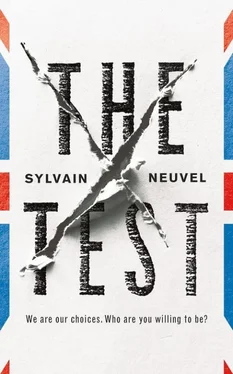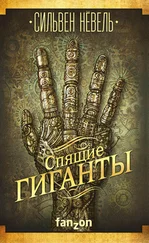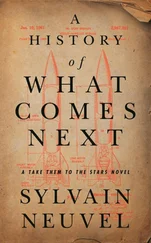Сильвен Нёвель - The Test
Здесь есть возможность читать онлайн «Сильвен Нёвель - The Test» весь текст электронной книги совершенно бесплатно (целиком полную версию без сокращений). В некоторых случаях можно слушать аудио, скачать через торрент в формате fb2 и присутствует краткое содержание. Город: New York, Год выпуска: 2019, ISBN: 2019, Издательство: Tor.com, Жанр: Фантастика и фэнтези, story, на английском языке. Описание произведения, (предисловие) а так же отзывы посетителей доступны на портале библиотеки ЛибКат.
- Название:The Test
- Автор:
- Издательство:Tor.com
- Жанр:
- Год:2019
- Город:New York
- ISBN:978-1-250-31283-9
- Рейтинг книги:4 / 5. Голосов: 1
-
Избранное:Добавить в избранное
- Отзывы:
-
Ваша оценка:
- 80
- 1
- 2
- 3
- 4
- 5
The Test: краткое содержание, описание и аннотация
Предлагаем к чтению аннотацию, описание, краткое содержание или предисловие (зависит от того, что написал сам автор книги «The Test»). Если вы не нашли необходимую информацию о книге — напишите в комментариях, мы постараемся отыскать её.
Praise for The Test:
Praise for the Themis Files
About the Author empty-line
6
empty-line
8 cite ―Kirkus reviews, starred review. cite ―NPR cite ―The Chicago Review of Books cite ―Pierce Brown
The Test — читать онлайн бесплатно полную книгу (весь текст) целиком
Ниже представлен текст книги, разбитый по страницам. Система сохранения места последней прочитанной страницы, позволяет с удобством читать онлайн бесплатно книгу «The Test», без необходимости каждый раз заново искать на чём Вы остановились. Поставьте закладку, и сможете в любой момент перейти на страницу, на которой закончили чтение.
Интервал:
Закладка:
Deep is a psychology major, and he’s read everything there is about BVA theory. Most trainees only care about the simulation itself, but Deep enjoyed discovering just how much generalization was actually possible, despite all our claims at uniqueness. He found comfort in knowing that humans are predictable things, that we each come with a lot of the same baggage of innate and learned little quirks.
Some of these quirks are helpful in the values assessment, others are an impediment and must be broken. System justification is the idea that many of our needs can be satisfied by defending and justifying the status quo. It gives stability to our political and economic systems because people are inherently inclined to defend it. It prevents people at a disadvantage from questioning the system that disadvantages them, makes people buy the inevitability of social inequity, ignore or support policies that hurt them. It fosters dependence on government, law enforcement. It discourages vigilantism and makes it more difficult to get someone to actively participate in a virtual-reality simulated terrorist killing. K1 helps establish their involvement as part of a new system the subject will find ways to justify.
System justification is one of many decision-avoidance mechanisms we carry around. When faced with a choice, humans almost invariably seek a no-action, no-change option, even when one of the presented alternatives is quantifiably and logically more advantageous. One person dying is obviously better than two people dying.
Here the aversion to decision-making is reinforced by a phenomenon called reactance: when we feel that someone, or something, is threatening or eliminating our behavioural freedom, even just limiting our options, our innate reaction is to try to re-establish that freedom. It often translates to our challenging rules or authority. Tell a child he has to play with toy number one and that he can’t touch toy number two, you can bet he’ll play, or at least want to play, with toy number two. It doesn’t matter how unattractive that toy is. The grass is always greener. When told they must choose who lives or dies, that they no longer have the right not to choose, subjects instinctively want to reassert that right.
More than anything, the BVA experiment creates a state of cognitive dissonance, a simultaneous belief in two contradictory things that creates inconsistency. Sending one person to their death is wrong, therefore I should not choose anyone. Not saving one person is wrong, therefore I should choose. Does not compute. Humans use little conundrums such as this one to defeat evil robots or out-of-control AI on television shows, but our own brains are surprisingly ill-equipped to deal with these types of inconsistencies.
The discriminative stimulus, the death of the two hostages, serves to weaken the subject’s decision-avoidance mechanisms and status quo biases. K1 pushes the subject to re-create consistency by reranking his or her contradictory beliefs. Letting two people die is more wrong than choosing who dies.
Long story short, no one chooses on the first kill.
On the large screen, Idir puts his hands over his eyes, as the terrorist fires his pistol twice and the bodies of both men hit the ground. Deep turns his chair back towards the desk and looks at his supervisor.
—Have you ever had a hero?
—Once. My second year. A football player from Tunisia.
—You did? What was it like?
Heroes are mythical creatures in the BVA world, people who physically take on the terrorists. It’s the quickest way to end the test. Only, no one does that. Well, almost no one. It happens once out every six hundred and sixty-five tests. Despite being so rare, heroes are controversial figures, the topic of many heated debates among BVA high-ups and the politicians in the know. Because they are so rare, statistics about them are unreliable. There isn’t enough data, and data is everything when it comes to the BVA. Every decision, down to the smallest detail—the colour of the floor or the way the chairs are arranged in the waiting room—is based on extensive datasets collected over years of experiments. BVA regulations indicate that heroes automatically pass and receive citizenship because, well, because they’re heroes. One could argue that someone who stops a terror attack is unlikely ever to participate in one. The argument coming from the anti-hero side is that these people are not only endangering their own life, but those of everyone else, by trying to accomplish something any sane person would realize is impossible. At best, that would make them incredibly stupid; at worst, sociopaths with a strong penchant for violence. Either way, not the kind of people you want to roll the red carpet for. Deep hasn’t quite formed an opinion on the matter but, like all BVA employees, he relishes the chance to see one in action.
—It’s not all it’s cracked up to be. The test part wasn’t that interesting. He was rude as hell, failed everything in politeness and courtesy. The terrorist walked into the test room and the subject tackled him right away, hard. Didn’t take more than a second or two. The door hadn’t even closed yet. The subject grabbed the weapon and ran out. He just… ran. He didn’t fire at anyone, just kept on running. It wasn’t long before we were out of programmed scenery. The system kept recycling the main lobby, showing the same room, the same people every time he went through the door. Over and over again. He must have gone through it a dozen times. It didn’t seem to bother him. He just kept going. He was still running when we woke him up.
—What happened then?
—Same as always. We explained to him what he had just experienced, that none of it was real. He took it just fine, better than most, actually. It wouldn’t have been any different if we’d told him he was on Candid Camera.
—What did you think of him?
—Officially? He’s a proud citizen of the United Kingdom, and we’re lucky to have him.
—Unofficially?
—That man was batshit crazy.
Of course, that story pushes Deep a little… deeper into the anti-hero camp, but he’s still on the fence. Part of him really wants heroes to be good. For a moment he wonders if that’s a form of system justification. No one wants to be a part of something they think is wrong. He quickly rejects the idea. Certainly, he can make informed, conscious decisions. He’s better than that. He’s not a subject.
Laura asks if he’s ready for K2. Deep nods.
—This is control. K2 is in eight minutes. Let’s get all our ducks in a row. This time I want one white male, midforties. Jeans and a T-shirt. Give him profile eighty-six, architect, no kids. That should be neutral enough. Then, I want a security guard. There weren’t any when the subject entered, so I want him obvious. The whole outfit: hat, badge, baton. Make him Middle Eastern. Small beard. Average skin tone.
Deep cringes. He doesn’t like K2 for a variety of reasons. He understands why the security guard has to resemble the subject but, in principle at least, the other hostage could be Asian, Latino, Indian. He never is. Deep is a citizen, but the only people that look like him during the BVA are the ones who are meant to die. As per the manual, the K2 setup is as follows: Hostage one is white. Hostage two resembles the subject, so unless he or she suffers from some deep-seated self-hatred, there won’t be a negative bias against him. Hostage two is also a security guard. The uniform, the baton. He’ll even say he’s a security guard. He’ll inevitably register as law enforcement. Except for criminals, there is a subconscious positive bias towards law enforcement officers because they put themselves at risk to protect the innocent. That ironically makes them expendable in the K2 setting because by choosing their career, they entered into an unspoken pact with society that makes their lives come second in this very unique situation. The subject is expected to choose the security guard as the victim, and does so in 92 percent of cases. To do otherwise, the BVA manual tells us, demonstrates a clear bias against people of the hostage-one ethnicity.
Читать дальшеИнтервал:
Закладка:
Похожие книги на «The Test»
Представляем Вашему вниманию похожие книги на «The Test» списком для выбора. Мы отобрали схожую по названию и смыслу литературу в надежде предоставить читателям больше вариантов отыскать новые, интересные, ещё непрочитанные произведения.
Обсуждение, отзывы о книге «The Test» и просто собственные мнения читателей. Оставьте ваши комментарии, напишите, что Вы думаете о произведении, его смысле или главных героях. Укажите что конкретно понравилось, а что нет, и почему Вы так считаете.












